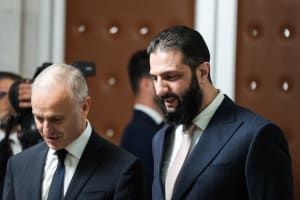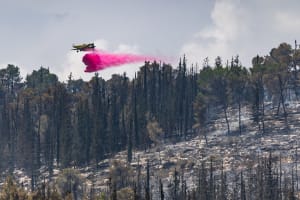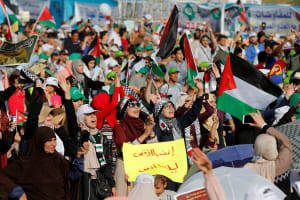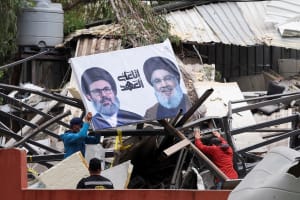WATCH: War or peace? - A look into Lebanon's divided voices on the conflict with Israel
In this in-depth ALL ISRAEL NEWS analysis update, we delve into the complex dynamics of Lebanon's media landscape to understand how the country is viewing the potential for an all-out war with Israel. From pro-Hezbollah outlets to critical voices, we examine the diverse perspectives on the crisis and explore whether Lebanon's widespread acknowledgement of the devastating consequences of war will be enough to prevent a looming escalation between Hezbollah and Israel.
Click on the video above to watch or read the transcript below.
War or peace? As Hezbollah and Israel teeter on the brink of a devastating war, diplomatic efforts continue and Lebanese voices protesting against Hezbollah’s apparent decision to take the country to war are getting louder.
It’s important to understand that Hezbollah is the strongest armed power in the country by far, but doesn’t rule it unimpeded or unopposed.
But Hezbollah has provoked this situation by joining Hamas on October 8th of last year, and its absolute power to take the country to war means that in effect, the Lebanese state is not sovereign and has no power, a fact that many of its citizens – especially Christians, Druze and Sunnis – feel keenly.
As Israelis, understanding the perspectives of our neighbors in Lebanon is crucial for several reasons.
First, it helps us gauge the potential for conflict or peace.
Second, it allows us to better understand the complex dynamics in the region and especially in this deeply divided country.
And third, it provides valuable insights into how our actions are perceived across the border.
We will now delve into the Lebanese media landscape to understand how our neighbors are viewing the potential for an all-out war with Israel, and more importantly, why they might be expressing these views.
Lebanon, once known as the 'Switzerland of the Middle East,' has a rich tapestry of voices in its media. Let's examine the perspectives from various outlets and prominent figures in Lebanon.
Al-Akhbar, a pro-Hezbollah newspaper, has been cautious in its rhetoric about full-scale war. Journalist Ibrahim Al-Amin writes: "Hezbollah is prepared for all scenarios, but prefers to maintain the current rules of engagement unless forced otherwise by Israeli escalation."
This measured tone from a typically hawkish source is noteworthy and may indicate a reluctance for a full-scale conflict.
Ali al-Amin, editor-in-chief of Janoubia News, offers a critical perspective of Hezbollah's stance: "The party stood idly by during the recent outbreak of violence between [Palestine's] Islamic Jihad and Israel [several years ago]. Hassan Nasrallah has repeatedly stressed his commitment to the unity of the resistance fronts, but has done nothing to defend Gaza and his Palestinian ally, which seriously undermines the legitimacy of his words."
On the other hand, Kassem Kassir, an analyst with close ties to Hezbollah, provides insight into the group's strategy: "Hezbollah seized the opportunity to send a message to the Israelis and warn them against any attempt to escalate in Lebanon as in Palestine."
Lara Saad, a legal advisor to the Christian Kataeb party in Lebanon, emphasizes the importance of Lebanese sovereignty: "Sovereignty cannot be partial or open to interpretation."
This highlights the complex internal dynamics in Lebanon regarding Hezbollah's actions and their potential consequences for the country.
Antoine Constantine, a political advisor to the Free Patriotic Movement, a Lebanese political party with a Christian support base but allied with other groups, including Hezbollah, offers a nuanced view: "We advocate a collaborative defense strategy encompassing all existing forces. This strategy should, however, not contradict the principle of sovereignty and should secure national consensus."
Lastly, Milad Alam, head of the Lebanese Forces in the Christian town of Rmeish, provides a perspective from the Christian community in southern Lebanon. He writes: "In our eyes, Israel remains an enemy country. However, Christians in the south are unanimously expressing their weariness of an unjustified war that has no horizon."
These diverse voices reflect Lebanon's complex political landscape. Despite varying opinions, there's a consistent concern about Lebanon's stability and sovereignty. Even pro-Hezbollah outlets seem to be tempering their rhetoric, recognizing the country's fragile state.
Notably, there's a lack of voices calling for escalation, possibly due to self-censorship given the dire consequences of war. Across the political spectrum, there's a clear understanding that Lebanon cannot afford another conflict with Israel.
The critical question remains: Will this widespread acknowledgment of potential devastation be enough to prevent a looming escalation with Israel?

The All Israel News Staff is a team of journalists in Israel.
You might also like to read this:















